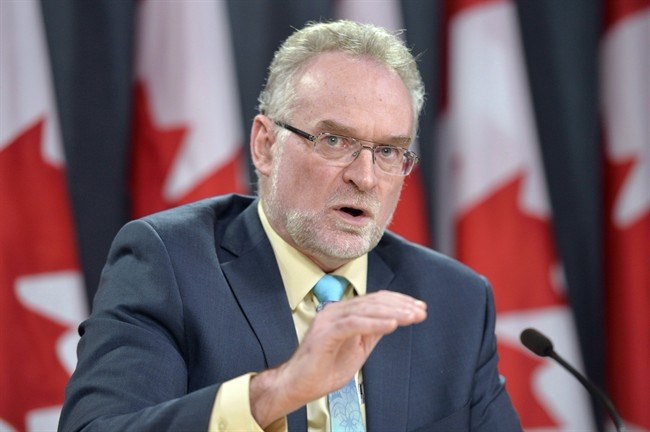
Auditor General of Canada Michael Ferguson speaks in Ottawa on May 6, 2014. Single phone calls, sandwiches eaten during committee meetings, postage stamps — the smallest details have come up for review in the auditor general's study of Senate expenses.Senators of all political persuasions have been taken aback by the strength of the microscope trained on their office, travel and living expenses, as well as claims submitted by staff.
Image Credit: THE CANADIAN PRESS/Adrian Wyld
March 16, 2015 - 4:57 AM
OTTAWA - Single phone calls, sandwiches eaten during committee meetings, postage stamps — the smallest details have come up for review in the auditor general's study of Senate expenses.
Senators of all political persuasions have been taken aback by the strength of the microscope trained on their office, travel and living expenses, as well as claims submitted by staff.
And it hasn't just been the types of questions that have ruffled feathers, but also the level of access accorded to auditor general Michael Ferguson's staff — some 40 auditors in any given month, his office said. They've been able to delve into the emails of senators, and has cell-phone records.
For example, the auditor general's office has been cross-referencing daily expense claims with activities, to verify if the upper chamber really needed to pay for a lunch or whether one was served in a meeting or on a plane trip.
The angst has been building steadily in the Senate as the final report draws closer.
Some have decided to fork over the cash before the report comes out — $185,677 was reimbursed to the public purse by unnamed individuals in the 2013-14 fiscal year alone, not including monies returned by embattled senators Mike Duffy, Pamela Wallin and Mac Harb.
Many senators complain bitterly that the auditor general's office has not shown a good understanding of what constitutes Senate business, and the daily work they do.
Several spoke to The Canadian Press on condition of anonymity — in many cases senators were asked to sign a confidentiality agreement when the audit began.
One senator complained about a perceived inequality built into the process: senators interviewed early in the process could hypothetically be treated more harshly than those scrutinized later, as the auditor general's staff become educated in the rules and rhythms of the upper chamber.
"(The auditors) didn't have the first clue about parliamentary business and public life in general," said one Liberal senator. "They are bean counters, and they work in a very narrow environment."
Said a Conservative: "They look for a job description — well, a senator's job description is public service. I don't know what I will be doing tomorrow, it depends on what issue the public is engaged in, who comes through my door, who asks for advice."
Conservative Sen. Scott Tannas offered a small window into the tension last month, when Ferguson appeared before a Senate committee on a completely unrelated topic.
"I'm curious if you could ... tell us about the thought process that brought you to feel that you, and we, would be comfortable with your presence here," Tannas said as an awkward silence settled into the room.
A major source of anxiety is over the type of travel that senators do on a weekly basis. How much time do they spend in their Parliament Hill office and why? What does normal travel look like in their home provinces?
An update of the travel policy was instituted in the summer of 2012, with an appendix noting that "speaking engagements or attendance at fundraising events other than those organized by the Senate" did not qualify for travel funding.
But what of the political events they might have attended prior to that guideline being introduced?
Sen. David Tkachuk, the former Conservative chairman of the all-important internal economy, budgets and administration committee, noted in an RCMP interview for the Wallin case that "if a senator was invited to an event as a senator, then that becomes Senate business."
Fellow committee member Sen. George Furey, a Liberal, said that "when a Senate event and a personal event are planned on the same day, it is a grey area for submission of an expense claim."
All of this confusion will also be hashed out in the upcoming trial of Sen. Mike Duffy, which involves several charges linked directly to his travel and living expenses.
News from © The Canadian Press, 2015